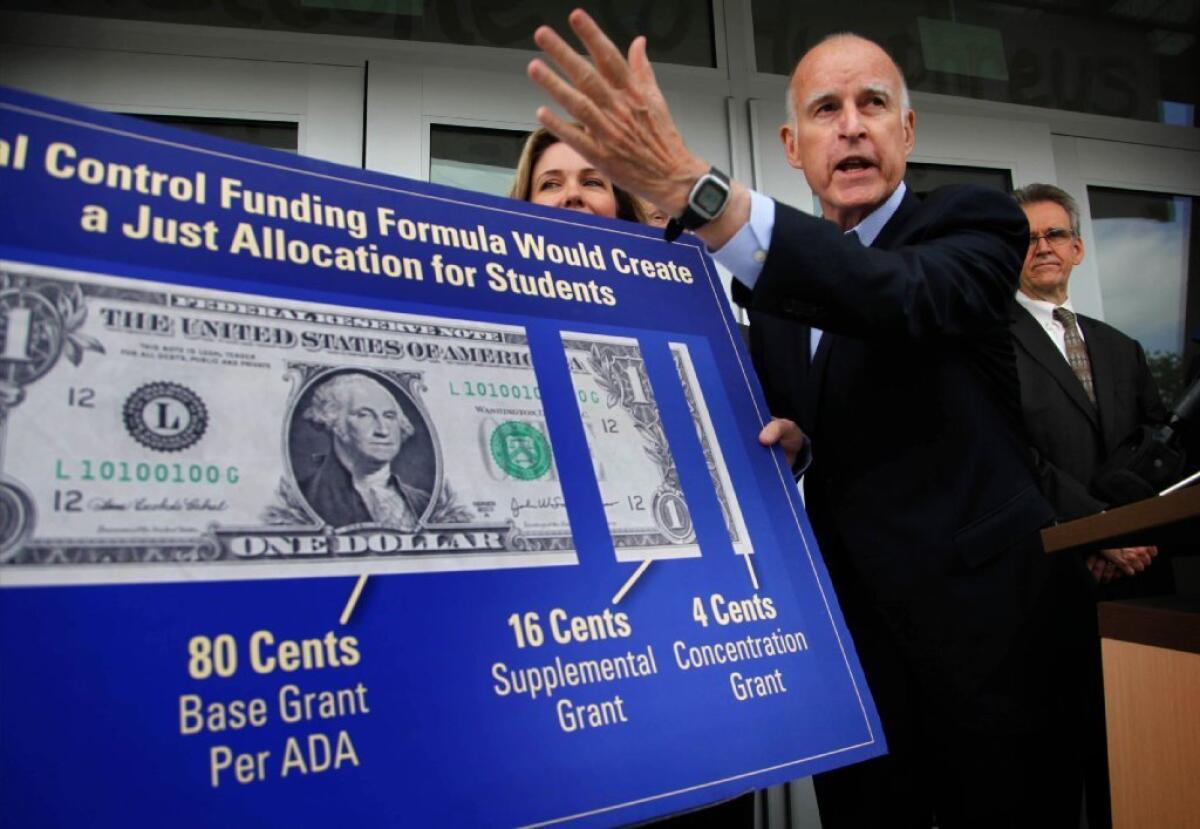Gov. Jerry Brown pitches education budget at East L.A. school

This post has been corrected. Please see note below.
California Gov. Jerry Brown visited an East L.A. campus Friday to tout his proposed state budget, which would shift more money to students with greater needs.
Brown said Humphreys Avenue Elementary was precisely the place that would get more aid and that the school deserved it.
“We’re trying to compensate a little bit for the difference between living in this neighborhood... [and] in Beverly Hills,” said Brown, standing with local dignitaries in front of the campus multipurpose room.
At Humphreys, about 98% of students are Latino, 100% are low income and about 50% are learning to speak and read in English.
Brown’s goal is to take 20% of the education allotment and distribute it based on the characteristics of the individual students enrolled in a school. Four percent would be reserved for schools with the highest concentration of the hardest-to-educate students.
“When you have more than 50% of kids in poverty or speaking another language, that is an extra barrier,” Brown said.
L.A. Unified could be a huge beneficiary, and has, in fact, based its own budget on the success of Brown’s initiative, which gave L.A. schools Supt. John Deasy substantial motivation to be supportive.
“Students need to be funded for situations beyond their control,” Deasy said. “Equity delayed is equity denied.”
The stakes for L.A. were made clear by the group that had assembled, which included local teachers union president Warren Fletcher, who has lately been at odds with Deasy. On Friday the two exhibited nothing but common cause.
Those on hand also included L.A. Area Chamber of Commerce president Gary L. Toebben and United Way of Greater Los Angeles chief executive Elise Buik.
Humphreys Principal Ricardo Tapanes said the state recession cut into resources for his campus of 827 students, one of the larger elementary schools in the state. Class size in the early grades increased from about 20 to about 24 students per teacher. Class sizes in the upper grades increased from 25 to about 30. He also had to cut back on intervention services that provide extra help for students.
He has a nurse only two days a week to assist students and families that often lack regular healthcare. He said he could use a full-time counselor and a psychiatric social worker.
“A lot of the issues have to do with the home life,” said Tapanes, noting a range of challenges such as lice infestations, deficient nutrition and child-abuse reporting.
Brown has encountered bipartisan resistance from lawmakers who represent other kinds of school systems, so his visit was intended as political marketing to buttress his budget release this week. Brown argues that his proposal redirects new state funding that has come through an improving economy and voter-approved taxes. But school systems statewide are still trying to recover from reduced funding of past years.
The governor took a swipe at Democrats who haven’t sided with him and also placed his plan in the context of a nationwide imperative for economic equity.
“As a society we’re getting more unequal every year and that’s going to tear us apart,” Brown said. “People of goodwill will see we’re all in it together.”
He left East L.A. for another similar event at a school in Long Beach.
[For the record 12:50 p.m. May 20: An earlier version of this post incorrectly stated that 6% of Brown’s education allotment would be reserved for schools with the highest concentration of the hardest-to-educate students. The correct number is 4%.]
ALSO:
Powerball jackpot hits record $600 million and climbing
Friends, family mourn Kern beating victim at Bakersfield service
Body found in remote area of Orange County; student still missing
Twitter: @howardblume | howard.blume@latimes.com
More to Read
Sign up for Essential California
The most important California stories and recommendations in your inbox every morning.
You may occasionally receive promotional content from the Los Angeles Times.










